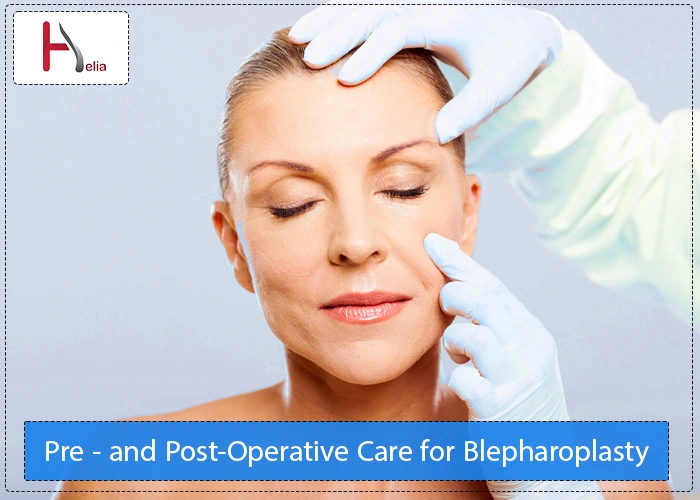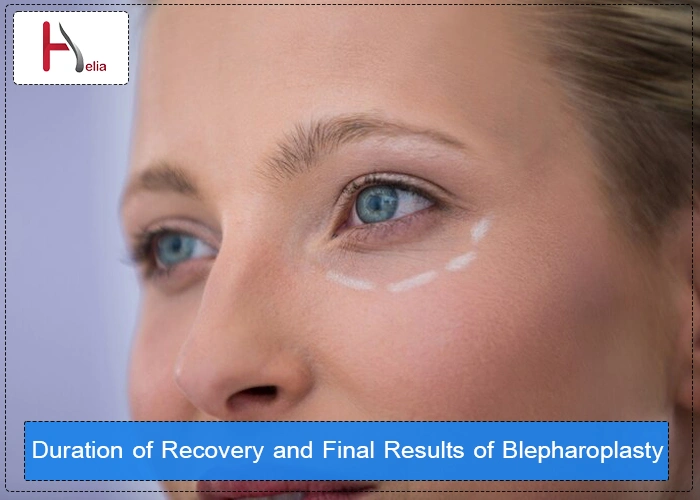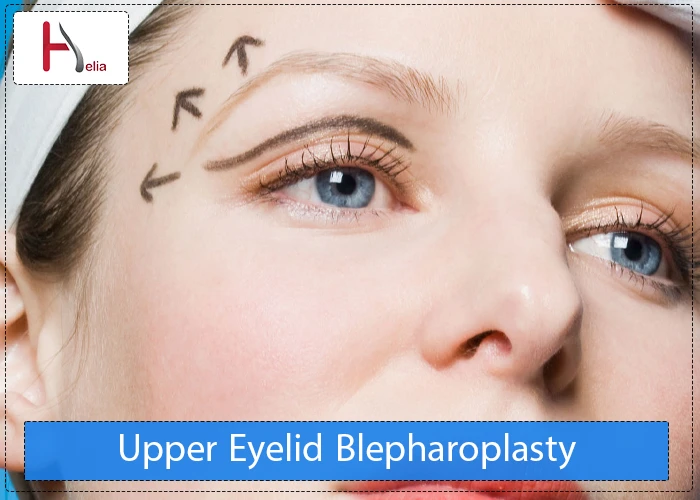One of the prerequisites for achieving the desired outcome after cosmetic procedures is paying attention to pre-and post-operative care and considerations. Blepharoplasty, as one of the most popular cosmetic surgeries, is no exception to this rule, and all individuals must carefully follow the pre-operative care instructions for blepharoplasty. Otherwise, it cannot be expected to achieve the desired result afterward. Many people believe that by choosing a reputable clinic and a skilled physician in this field, they can successfully undergo blepharoplasty. However, pre-operative considerations are equally important.

Familiarity with pre-operative considerations for blepharoplasty
Preparation before blepharoplasty can be considered one of the most important tasks that require significant attention. By following recommendations and necessary measures for eyelid surgery, you can significantly reduce the risks and complications associated with blepharoplasty and experience a faster recovery after the surgery.
Blepharoplasty is a cosmetic procedure performed to eliminate skin wrinkles and eyelid sagging. Over time, as the skin wrinkles and sags, you may experience drooping eyelids, which can be treated by undergoing eyelid surgery. Like any other surgical procedure, certain preparations need to be made before blepharoplasty to ensure a smooth operation and to prevent any issues during or after the surgery. Therefore, to obtain fruitful results from blepharoplasty, it is necessary to carefully follow these recommendations.
Preparation Before Blepharoplasty
Before undergoing blepharoplasty, it is important to first consult with your chosen physician and ask them questions about the treatment and the procedure itself. You can make a list of questions, such as the details of the surgery, the recovery period, the treatment process, post-operative measures, pre-operative preparations, potential post-operative complications, dietary considerations, and many other questions, to ensure that you have sufficient information about blepharoplasty and know what steps and measures to take to prepare for the eyelid surgery.
- One of the important preparations that can be crucial before the surgery is mental and emotional readiness. This aspect has a significant impact on individuals’ overall well-being. Pre-operative stress and tension can affect your mindset and lead to various post-operative issues. The most significant impact of stress is a weakened immune system, which can result in delayed wound healing. Therefore, it is necessary to discuss this with a psychologist before undergoing blepharoplasty to help alleviate stress.
- Before blepharoplasty, it is important to avoid consuming foods, medications, and vitamins that thin your blood.
- It is recommended to maintain hygiene and take a shower before the surgery.
- Make arrangements in advance for someone to accompany you from the clinic to your home.
- Also, coordinate with someone to stay with you for the first 24 hours after the surgery.
- Dress comfortably in suitable clothes that can be easily opened and closed with buttons.
To inquire about the cost of blepharoplasty, you can contact the specialized skin and hair clinic consultants at Helia Clinic free of charge at +971561004050. You can also share all your questions about blepharoplasty and other beauty services with us through WhatsApp at +971561004050

Pre-Operative Consultation for Blepharoplasty
Pre-operative consultation can be considered as an assisting factor for individuals undergoing blepharoplasty. Usually, the physician performing the eyelid surgery can serve as a consultant for the procedure.
- During a consultation session, it is important to discuss your surgical goals, medical conditions, drug sensitivities, previous medical treatments, and specifically any issues related to your eyes.
- Additionally, inquire about the current use of prescription medications, including vitamins and herbal supplements, with a specialist.
- It is necessary to talk to your physician about the possibility of consuming alcohol, tobacco, and drugs.
- If you have previously undergone any eyelid or other body surgeries, inform your doctor.
- If you have any specific medical conditions or are diabetic, discuss these conditions during the consultation session.
- Furthermore, the physician should also ask you questions and may recommend a treatment plan. They should discuss the potential outcomes, risks, complications, and the type of anesthesia for blepharoplasty. Finally, they may take photographs of you for comparison with post-operative photos to be archived in your medical record.
Pre-Operative Consultation for Eyelid Surgery
Pre-operative consultations should be conducted before undergoing eyelid surgery, where common questions from the patient are addressed by the physician to determine if the individual is suitable for blepharoplasty. Some patients may have underlying issues or other medical conditions that pose significant risks for eyelid surgery. It is important to evaluate your overall health status, any existing health conditions, and risk factors. For this reason, individuals need to carefully follow their physician’s recommendations to avoid post-operative risks.
The clinics where blepharoplasty is performed can also serve as consultants for the patients. Before the consultation, you should have a checklist of questions prepared. We have prepared a sample checklist of questions for your convenience to ask your surgeon and consultant:
- Are you a member of the Iranian Plastic Surgery Association and do you have the necessary license?
- Have you received specialized training in plastic surgery?
- How many years of experience do you have in plastic surgery?
- Is it possible to see previous examples of surgeries you have performed?
- Is it possible to connect with other patients who have been operated on by the same surgeon?
- Do you have privileges at specific hospitals for performing this procedure? If so, which hospitals?
- Are the surgical facilities in your clinic or the hospital where the surgery will take place accredited or have government or Medicare approval?
- Am I a suitable candidate for this surgical procedure? If not, what alternative method do you recommend, or what treatment do you suggest?
- Where and how will my surgery be performed?
- What surgical technique is recommended for me?
- How long is my recovery period, and what kind of assistance will I need during the healing process?
- What are the risks and complications associated with my chosen surgical method?
- How are complications treated?
- What can I expect in terms of the gradual improvement and natural appearance of my eyes over time?
- What options do I have if I am not satisfied with the cosmetic outcome of the eyelid surgery?
- Will before and after photographs be taken for me to review the results of the procedure?
Pre-Operative Care Required Before Eyelid Surgery
As eyelid surgery, known as blepharoplasty, involves the upper and lower eyelids, proper pre-operative care is essential to minimize post-operative complications. Here are some guidelines to follow before undergoing eyelid surgery:
- Avoid medications that thin the blood, such as aspirin, ibuprofen, anti-inflammatory drugs, vitamin E, herbal supplements, naproxen, or any other medication containing blood-thinning properties. Generally, refrain from using Advil, Motrin, naproxen (Aleve), and other non-steroidal anti-inflammatory drugs for two weeks before the surgery.
- Cease alcohol and cigarette consumption approximately two weeks before blepharoplasty. Nicotine found in tobacco products can hinder the healing process and delay recovery from the surgery. This can be an opportune time to quit smoking or using hookah. Additionally, alcohol thins the blood and increases the risk of bleeding during the surgery.
- Use pain relievers and analgesics like acetaminophen and multivitamins in the days leading up to the surgery to help manage post-operative pain.
- Refrain from eating or drinking after midnight on the night before the surgery. A full stomach during the procedure can cause discomfort. Avoid heavy meals after midnight (the night before the surgery).
- Prepare all the necessary items you will need after the surgery. Create a checklist and gather everything you require in advance.
- If you wear contact lenses, consult with your doctor and avoid using them before the surgery.
- Avoid any medications that may cause eye inflammation.
- Remove eye makeup before blepharoplasty or avoid using it for at least one week before the surgery.
- Take a warm shower before the surgery and maintain good personal hygiene.
- Ensure you have sufficient sleep and rest before the eyelid surgery to prevent tired eyes.
Costs of Pre-Operative Care for Blepharoplasty
The costs associated with pre-operative care for blepharoplasty are minimal. By following the doctor’s recommendations before the procedure, individuals can avoid any potential complications. Therefore, there is no need to incur significant expenses for pre-operative preparation for blepharoplasty.
The cost of the surgery itself can vary in each individual, depending on the type and extent of the condition. These costs are influenced by various factors, such as the type of the attending physician, their skill and experience in this field, the clinic where the eyelid surgery is performed, the services provided at the clinic, the specific technique used for blepharoplasty, and many other factors.

Eye Makeup After Blepharoplasty
Using eye makeup after blepharoplasty is prohibited because it can lead to inflammation and aggravate swelling. Therefore, it is necessary to refrain from using eye makeup until the recovery period after the surgery.
Final Result of Blepharoplasty
In the initial days following blepharoplasty, the eyelids may not have a beautiful appearance due to swelling and bruising. However, this is completely normal. After a few weeks post-surgery, the beauty of the eyelids becomes apparent, and the final result of the blepharoplasty can be observed.
What to Eat After Blepharoplasty
The post-operative diet should include essential vitamins. Foods containing protein also help accelerate the recovery process. Additionally, the consumption of fluids and soft foods such as porridge, pureed potatoes, and others is highly recommended.
To inquire about the cost of blepharoplasty, you can visit Helia Skin and Hair Clinic and consult with experienced specialists. For a consultation, you can contact them at +971561004050. Alternatively, you can also benefit from online consultation through the website’s chat system.




